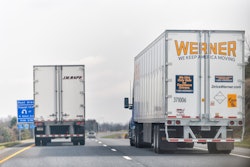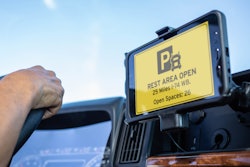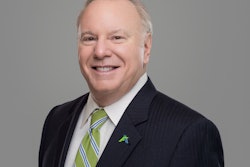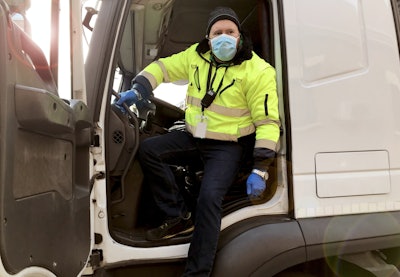
Drivers with American Central Transport were under the impression that folks back at the office were part of an exclusive club with plenty of masks and gloves in the midst of a growing pandemic while they were getting left out in the cold.
ACT vice-president of operations, Brian Matthews, said he and other decision makers at the Missouri-based dry van carrier learned about their drivers’ angst through the WorkHound app, an anonymous reporting tool that drivers can use 24/7 to reveal their impressions, good and bad, on important work-related topics. That includes COVID-19, and during the onset of the pandemic, comments were pretty concerning.
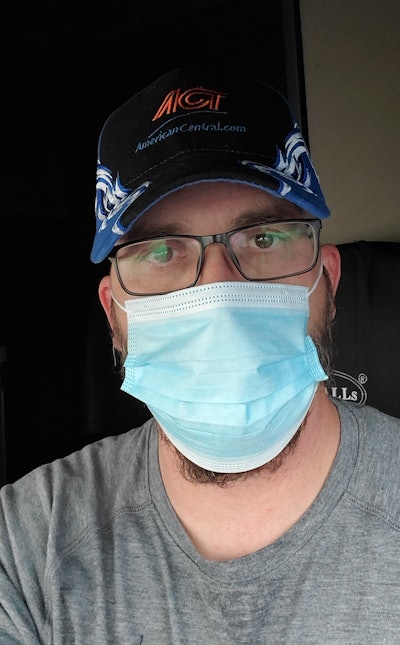 ACT drivers are required to wear masks during some stops. There’s no one-size-fits all when it comes to PPE and varying policies across the country, ACT vp of operations Brian Matthews said.
ACT drivers are required to wear masks during some stops. There’s no one-size-fits all when it comes to PPE and varying policies across the country, ACT vp of operations Brian Matthews said.“There was this mentality that everyone in the office was walking around with gloves and masks on and that they were just left to fend on their own and that wasn’t the case at all,” Matthews explained. “But we had to get that message out there so we worked to get that and as those things came in we’ve been very clear in communicating that we have gloves, we have masks, we have hand sanitizer for them. Not only that but we were reassuring them this whole time that we were taking additional measures to make sure the facilities that we do have are clean and sanitized multiple times a day.”
To better address the concerns of drivers and other employees, Matthews and ACT President Phil Wilt began sending out podcasts and fleetwide messages multiple times a week. Emphasis was also placed on stepping up communication efforts between the operations department and drivers.
Getting personal protective equipment (PPE) proved challenging for ACT from the start and, judging by initial comments on WorkHound, drivers were getting impatient.
“We just tried to counteract that by being honest and letting them know how we were struggling,” Matthews said.
A team was set aside to focus on sourcing PPE and drivers were notified as additional masks, gloves and sanitizer were secured. Still, Matthews said PPE can still be hard to come by, particularly as more companies require them for employees and those that visit their place of business.
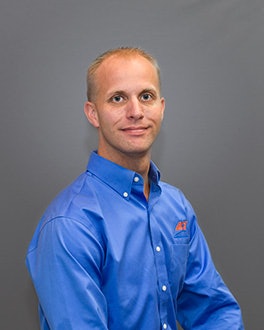 Matthews
Matthews“Every day I get more emails and phone calls from customers saying they’re requiring PPE at their facility, so that’s been a challenge as well,” Matthews said. “We’ve tried different means, like showing drivers how to make their own masks if they need to if they can’t get one from us, how to get gloves and different things along those lines.”
As driver feedback continues 24/7, Matthews has seen the light at the end of the tunnel.
“We saw a move from ‘we weren’t doing enough’ initially to all the way of being ‘great,’ ‘outstanding,’” Matthews said. “And a lot of that revolves around what’s happening in the industry around us. While truckload companies were doing things, they were expecting similar things from us. And normally, we would have to guess what our drivers are thinking or seeing, but with WorkHound we’re getting that in realtime. As I’m reading a news release someone else has picked up on it and put it on social media and the drivers have landed on it right away, so (WorkHound) really makes sure that we’re following along with what’s going in the industry but also with our drivers.”
While reducing contact with others is ideal, it’s not always possible for drivers particularly when it comes to dealing with bills of lading. The switch to an all-electronic paperwork platform to reduce or even eliminate person-to-person has come up more often in conversations.
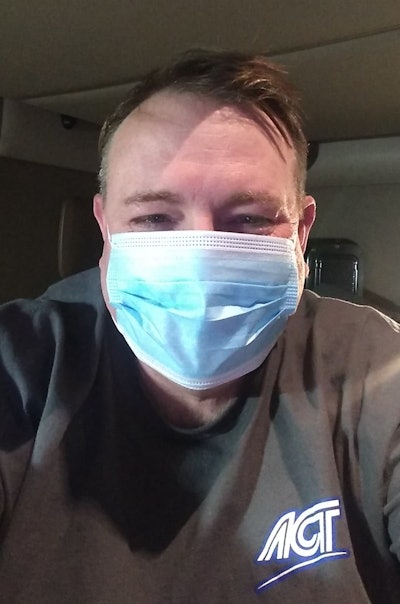 Matthews said it’s still a challenge finding PPE.
Matthews said it’s still a challenge finding PPE.“There’s been talk of that. That’s very difficult to practically implement to make everything paperless,” Matthews said. “There’s truly an opportunity within the industry to go paperless but right now that’s not something that I see happening overnight because it would take a lot of coordination among various shippers, consignees and carriers to handle that, but that would be a great way to keep physical separation.”
WorkHound CEO and founder Max Farrell explained that feedback collected from drivers is categorized to help companies better understand employee concerns. For instance, COVID-related comments are divided into nine themes: pay, morale, sanitation, risk, planning, work, necessities, benefits and denial. Some comments fall into multiple categories.
“Each company we work with has a weekly call with a customer success manager from WorkHound to discuss issues and trends,” Farrell said. “On those calls we discuss possible actions and craft messages to send back to the workforce. By doing this, we show the drivers that the company is listening, working to get better, and that their voice matters.”
As COVID-19 began emerging in news reports across the U.S., WorkHound began noticing more comments from drivers concerning the pathogen.
“In early February, our team began to see COVID-19 in feedback and by March, more than 29% of all comments on our platform we’re related to COVID-19,” Farrell said. “And now, just over halfway through April, the number of comments from the first through the fifteenth, have already exceeded the entire month of March.”
The most common concern of drivers surrounding COVID-19 is pay.
“This overtook sanitation and planning for the most mentions around the virus from drivers,” Farriell said. “We’ve witnessed news about carriers granting drivers hazard pay during this time. Five percent of driver messages in the past have been about pay but it’s increased significantly since then.”



